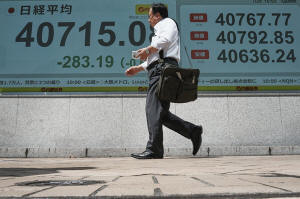Asian shares trade mostly higher after stocks on Wall Street extend
losses
[August 06, 2025] By
YURI KAGEYAMA
TOKYO (AP) ó Asian shares were mostly higher in muted trading Wednesday,
after discouraging signs about the U.S. economy sent Wall Street shares
declining, and
Investors are sifting through a slew of corporate earnings reports to
assess how businesses may have been affected by U.S. President Donald
Trump's tariffs.
Among Japanese companies, automakers Honda Motor Co. and Toyota Motor
Corp. will report fiscal first quarter results this week, as will
electronics and entertainment company Sony Corp.
Japan's benchmark Nikkei 225 rose 0.6% to finish at 40,794.86.
Australia's S&P/ASX 200 added 0.8% to 8,843.70. South Korea's Kospi was
little changed, gaining less than 0.1% to 3,198.14.
Hong Kong's Hang Seng rose 0.2% to 24,958.75, while the Shanghai
Composite gained 0.8% to 3,633.99.
U.S. futures were up 0.5%.
On Tuesday, the S&P 500 fell 0.5% to 6,299.19, coming off a whipsaw
stretch where it went from its worst day since May to its best since
May. The Dow Jones Industrial Average dropped 0.1% to 44,111.74, and the
Nasdaq composite fell 0.7% to 20,916.55.
A weaker-than-expected report on activity for U.S. businesses in
services industries like transportation and retail added to worries that
Trumpís tariffs may be hurting the economy. But conversely such
indicators raise hopes the Federal Reserve may cut interest rates. That
along with a stream of stronger-than-expected profit reports from U.S.
companies helped to keep losses in check. The S&P 500 remains within
1.4% of its record.

[to top of second column] |

A person walks in front of an electronic stock board showing Japan's
Nikkei index at a securities firm Tuesday, July 29, 2025, in Tokyo.
(AP Photo/Eugene Hoshiko)
 The pressure is on companies to
report bigger profits after the U.S. stock market surged to record
after record from a low point in April. The big rally fueled
criticism that the broad market had become too expensive.
For stock prices to look like better bargains, companies could
produce bigger profits, or interest rates could fall. The latter may
happen in September, when the Fed has its next policy meeting.
Expectations have built sharply for a rate cut at that meeting since
a report on the U.S. job market on Friday came in much weaker than
economists expected. Lower interest rates would make stocks look
less expensive, while also giving the overall economy a boost. The
potential downside is that they could push inflation higher.
Treasury yields sank sharply after Fridayís release of the jobs
report, and they havenít recovered. The yield on the 10-year
Treasury eased to 4.19% from 4.22% late Monday and from 4.39% just
before the release of the jobs report. Thatís a significant move for
the bond market.
In energy trading, benchmark U.S. crude rose 57 cents to $65.73 a
barrel. Brent crude, the international standard, added 64 cents to
$68.28 a barrel.
In currency trading, the U.S. dollar edged up to 147.66 Japanese yen
from 147.61 yen. The euro cost $1.1575, down from $1.1579.
All contents © copyright 2025 Associated Press. All rights reserved |